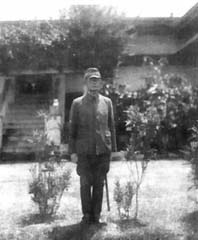the former Prince Charles of Denmark, was elected king of Norway in 1905 when the country gained its independence from Sweden; rallied his people when German troops invade in April 1940; refused to recognize the authority of Vidkun Quisling's collaborationist government and withdrew with the retreating British forces in 1940 after their abortive attempt to dislodge the Germans; from London, promoted the formation of Free Norwegian forces and supported the resistance movement in his country; returned home in 1945 to great acclamation.

highly capable German general and Chief of the General Staff from 1938, responsible for the military planning (though not the conception) of the German campaign in Poland in 1939, the Western Offensive in 1940 and (the abandoned) Operation Sealion, the planned invasion of England; much of the early German success in the 1941 invasion of the Soviet Union was due to Halder's preparations, although he was dismissed in 1942 after disagreement with Hitler over strategic issues; his record of anti-Hitler activities seems to have been prompted by doubts about Hitler's military rather than moral leadership; plotted to arrest Hitler during the Munich crisis, and approached the Vatican during 1939; after the military successes of 1940, however, appears to have accepted Hitler's authority; his ambivalence about accepting a Nazi head of state is increasingly characteristic of many senior German officers, unable to support Nazi policy; they nevertheless developed a technical loyalty to Hitler that fundamentally ignored the moral issues; arrested and sent to Dachau after the failure of the July Bomb Plot in 1944, survived to be liberated by American troops in 1945.

brusque and dynamic American admiral, an early exponent of the use of naval air power, won his first carrier command in the mid-1930s after distinguishing himself as a destroyer commander in World War I and winning his pilot's wings in 1935; in December 1941 was at sea in command of a carrier task force under the flagship Enterprise and participated in one of the first US Navy carrier offensives of the Pacific War against the Japanese positions in the Gilbert and Marshall Islands; aggressive and salty in his approach - he later coined the operational motto for SoPac (US South Pacific forces): "Kill Japs, kill Japs, kill more Japs!"; was informal and solicitous with his subordinates, who regarded him highly; promoted Commander of Carriers, Pacific Fleet as well as Commander, Carrier Division 2, in the spring of 1942, was absent from the Battle of Midway in June due to ill health but returned in the autumn when he replaced Vice Admiral Ghormley as Commander of South Pacific Forces; his fighting reputation and personal flamboyance proved an important tonic to US troops in the South Pacific, although it took nearly 2 years of hard fighting, from Guadalcanal through the Russell and Solomon Islands campaigns, before Halsey, now back at se in command of 3rd Fleet (June 1944), was able to join up with the 5th Fleet under Spruance for the start of Central Pacific operations; in October 1944, received orderes to sail to support General MacArthur's landing at Leyte in the Philippines; his controversial role in the subsequent battle did little to undermine his overall reputation as an exceptional carrier commander, although the later loss of a number of ships and many lives when his Fleet was was hit twice by typhoons in December 1944 and June 1945 resulted in courts of inquiry to establish responsibility for the losses; despite being held partly culbable and criticized for taking inappropriate action in both cases, was considered viatl to the US efforts in the Pacific and continued to command 3rd Fleet in the final US offensive against the Japanese home islands, launched on July 1; was present at the signing of the surrender document aboard the USS Missouri on September 2, and was promoted to admiral in December, remaining on active service until 1947.

commanded US forces in the South Pacific and was responsible for the invasion of the Solomon Islands and the Guadalcanal campaign; led Army Air Forces in the entire Pacific Ocean area from July 1944; directed the strategic air offensive against the Japanese home islands.

American businessman and diplomat, acted as President Roosevelt's negotiator with Stalin; in 1941, was put in charge of the Lend-Lease arrangements in London, where he had built up a solid relationship with Churchill; in September of that year he accompanied Lord Beaverbrook, the British Minister of Supply, on a mission to Moscow to establish relationships following the German invasion of Russia; a firm advocate of co-operation with Russia, was appointed ambassador to Moscow in 1943; was subsequently in direct contact with Stalin, and an important participant in all the major Allied conferences, including Yalta, where he negotiated with Soviet Foreign Minister Molotov over the Far East; after the war, acted as an unofficial foreign policy adviser to the White House.
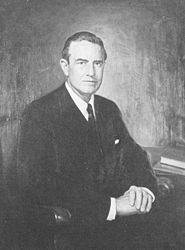
most outspoken proponent of the RAF's controversial policy of area bombing and C-in-C of Bomber Command from February 1942, had seen distinguished service as a pilot in World War I, and commanded No. 5 Bomber Group in 1939; in 1941 led an RAF delegation to Washington where he established good relations with US Air Chiefs, including Generals Eaker and Arnold, during discussions over air co-operation; following his promotion to C-in-C Bomber Command, furiously promoted a renewed offensive strategy, area bombing, which focused on civilian targets and the destruction of civilian morale; his immutable advocacy of this policy of terrorization, which reached an early climax in the devastating 'Thousand Bomber Raid' on Cologne on May 30, 1942, and whose effectiveness was increasingly subject to criticism, characterized Harris's continued approach to the air war; suspicious of innovations, such as the Pathfinder Force which substantially increased the accuracy of bombing raids, nevertheless presided over significant improvements to the techniques and success of Bomber Command's 50 operational squadrons, which continued to raid Germany in the night-time area bombing offensive during 1943 and 1944, causing unprecedented damage to many regions, particularly the Ruhr, Hamburg and Berlin; having retained the endorsement of the British War Cabinet, even after the controversial destruction of Dresden in February 1945, was promoted to Marshal of the RAF after the war and received a baronetcy in 1953; the moral rectitude of his unequivocal commitment to area bombing has since been regularly questioned, but during the war it was generally believed in Britain that the defeat of Nazism (and to a lesser extent the avoidance of a bloody land campaign in Europe) represented a higher moral imperative.
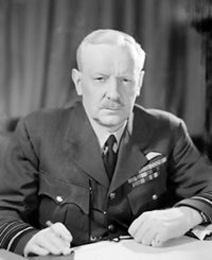
from 1939 to 1942 commanded the US Asiatic Fleet, which was based near Manila and comprised one heavy and two light cruisers, 13 destroyers, 29 submarines, 6 gun-boats, 5 minesweepers and 32 flying boats; it was no match for the Japanese invasion forces dispatched to the Philippines at the start of 1942 and was led by Hart to safer waters in the Dutch East Indies, before he resigned as C-in-C; briefly appointed Gen Wavell's commander of the Allied naval forces in the Far East (ABDA), directed actions in the Makassar Strait of Borneo, but resigned his command to Dutch Adm Helfrich immediately before the Battle of the Java Sea that breached the Allied defense line, the 'Malay Barrier', and won for the Japanese control of Java.
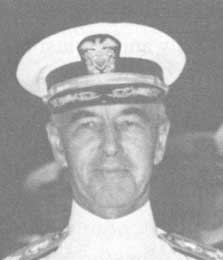
able German general with a considerable reputation in defensive tactics won during his long service on the Eastern Front; commanded the 4th Army under von Kluge from January 1942 and later led the 1st Panzer Army and the Hungarian 1st Army in the retreat to Silesia during 1944; one of the most long-serving of Hitler's wartime generals, was captured by the Russians after the fall of Berlin, whose defense he had been appointed to lead; was repatriated in 1955.

born in Alexandria, Egypt; became an aviator in World War I and then a political science student in March; joined the Nazi Party in 1920 after hearing Adolf Hitler speak; tookd part in the 1923 Munich Beer Hall Putsch and spent 7 months in Landsberg Prison, where he helped Hitler write his best-selling Mein Kampf which was dedicated to Hess; became the Führer's private secretary; introverted and subservient, served as deputy führer until September 1939, when Herman Göring replaced him; made world headlines in May 1941 when he flew alone to Scotland, ostensibly in an unofficial peace mission; his proposals were ignored by the British who held him as a prisoner of war; was declared insane by Hitler; sentenced at the Nuremburg tribunals to life imprisonment; spent 35 years in Spandau Prison; the Soviets, unlike the other Allies, were unwilling to free Hess once he had become an aged and ailing man; committed suicide in 1987, the last remaining major war criminal in captivity.
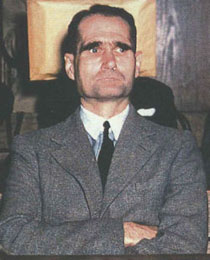
an expert in amphibious operations who put General George S. Patton Jr.'s Western Task Force ashore at Casablanca in 1942; led the US 8th Fleet in North African waters; directed naval operations in the invasions of Sicily, Italy and southern France.

Chief of the SS Reich Security Head Office and Protector of Bohemia and Moravia (governor of occupied Czechoslovakia); widely regarded as one of the most ruthless and effective senior Nazi Party functionaries, his rise through the party was sponsored and encouraged by Heinrich Himmler, who was impressed by his exceptional organizational abilities, intimidating Nordic appearance, intense anti-Semitism and utter ruthlessness; was also almost certainly of Jewish origin though he had suppressed the facts from early in his career; Himmler's knowledge may well have contributed, ironically, to his attratcion to Heydrich, confident that the information provided a sure lever of control over his exceptionally talented associate; certainly from 1931, when Heydrich joined the Party as an unemployed ex-naval officer, Himmler was prepared to promote Heydrich until he became the second most powerful man in the RSHA; having headed the SD and created the notorious Einsatzgruppen, was appointed Obergruppenführer SS in 1941, by which time it is almost certain that he was already deeply involved in organizing the machinery of genocide of the Jews in co-operation with Eichmann, described by senior Nazis as the 'Final Solution' to the Jewish Question; appointed Reich Protector of Bohemia to succeed Neurath in September 1941, his regime saw staggering brutality in the early stages, followed by a policy of 'carrot and stic' which divided and neutralized opposition; in circumstances that have remained mysterious and controversial, was assassinated by a group of Czech soldiers flown in from London, following a decision made by the British government; despite requests from the Czech resistance fearful of massive reprisals to call off the attempt, he was shot and injured by a hand grenade May 27, 1942 and died on June 4 in a Prague hospital; inexplicably, remained the only Nazi leader whose assassination was plotted by the Allies; in retribution, the village of Lidice was razed and its inhabitants massacred, thousands of Czechs were deported to Mauthausen concentration camp and the hostility of Czechs toward their German occupiers was guaranteed.
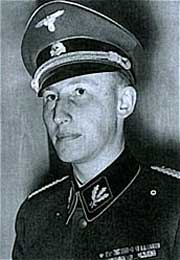
German head of the SS from 1929; and early adherent of German nationalist movements, became a fanatically devoted member of the Nazi Party working as general secretary to Gregor Strasser and then in the Schutzstaffel bodyguard, the nascent SS; at this time also devoted his energies to the development of his extraordinary politico-eugenic theories, in breeding experiments carried out on his smallholding chicken farm in Landshut, Bavaria; between 1929, upon becoming chief of the SS (then numbering 280 and still a branch of the SA), and 1936 upon assuming control of all the state police forces, worked assiduously to increase the size and breadth of function of the SS; after 1936, developed greater and greater aspirations to power in the Nazi state: by 1942, when his SS empire reached its zenith, controlled in addition to the vast administrative and policing network, the Gestapo, the concentration camp system, the feared Einsatzgruppen, and a vast Waffen SS army of 40 divisions; in addition the SS had developed a highly profitable economic section, which owned its own industries, and had embarked on a human breeding program based on the Lebensborn maternity homes serviced by chosen SS men that was designed to perfect a future German elite; from 1941, when Bormann replaced Hess as head of Hitler's secretariat, was Bormann's only real rival for Hitler's confidence; aside from his responsibility for the direction of all instruments and organs of repression in the Third Reich; was also without doubt the prime mover in the execution of the policy known as 'The Final Solution' to the Jewish Question; is almost alone among leading Nazis in unequivocally articulating the concept of the extermination of the Jewish people, recorded in several speeches to concentration camp officers, where he lectured them on their responsibility for destroying a whole people; after the failure of the July 1944 Bomb Plot, reinforced his position by removing rivals such as Abwehr chief, Admiral Canaris, and by exploiting Hitler's mistrust of his generals to secure his appointment as C-in-C of the Army reserve; given command of Army Group Upper Rhine and then, in January 1945, of Army Group Vistula, his lack of military experience was disastrous in the face of the Russian advance; as the German Army was discredited in defeat and Bormann took control in Berlin, made an initial approach to the Swedish Red Cross representative Count Bernadotte, though he hesitated to commit himself formally when they met in April 1945; returning to Berlin, was dismissed from all posts by Hitler, two days before his suicide; the final Dönitz government saw him as a liability; hoping to escape arrest, took the name and documents of a dead village policeman, but was unable to sustain the deception when stopped at a routine check by British military police and admitted his real identity; was arrested, but took poison before he could be interrogated.
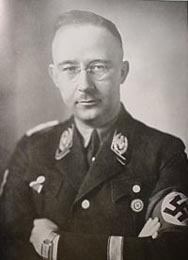
revered as both god and father of the Japanese people; reigned from 1926 until his death; was a seemingly mild and ineffectual man who yielded to the demands of his miltaristic cabinet, although the degree of Hirohito's involvement in the policies that led to war has been a subject of debate among scholars since his death; as the tide turned from 1942 on, became more involved in state affairs, calling upon the nation to make sacrifices in his name; when Japan surrendered, made the announcement in a radio speech, the first time the Japanese people had heard his voice; allowed to remain on the throne at the time of Japan's surrender, although he was required to publicly renounces his divinity; under the US occupation, worked with US General Douglas A. MacArthur in rebuilding his country, and at the time of his death, was widely revered and respected.
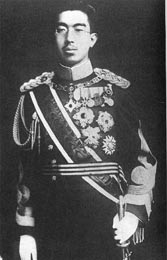
enraged by the perceived humiliation of Germany by the 1919 Treaty of Versailles, used persuasive oratory, brutality, and skilled propaganda to lead his National Socialist Party to power; his first grab at power was the failed Munich Beer Hall Putsch in 1923, which landed him in prison at Landsberg for 9 months, during which time he wrote his memoir, Mein Kampf; used the electoral process to climb to power; was appointed chancellor by President Paul von Hindenburg after the Nazi party became the largest in Germany; when Hindenburg died in 1934, proclaimed himself head of state and commander in chief of the German armed forces; never his his goal for eliminating Europe's Jews and to take territories in the East, principally in the Soviet Union for Lebensraum ('living space') for the German people; after outmaneuvering the irresolute French and British governments in the late 1930s, started World War II by invading Poland, crushed much of Western Europe in lightning campaigns, and retained the initiative for two years; after the Royal Air Force's defeat of the Luftwaffe in 1940, called off a plan to invade England; gazed eastward toward an invasion of the Soviet Union; his invasion of the Soviet Union in June 1941 would prove his undoing; was unable to manage a war on 2 fronts, especially after the United States joined the Allies following Hitler's reckless declaration of war against the Americans in 1941; clung stubbornly to a strategy of holding every inch of ground and left his able general staff with little or no room to maneuver; ranted and raged in a fantasy world long after an Allied victory was inevitable; maintained his hold on the German people until the end; despite several attempts on his life during his reign of terror, remain unchallenged until he committed suicide in his Berlin bunker on April 30, 1945, as the Allies closed in.

deputy commander of the US 1st Army under General Omar N. Bradley; organized the landings at Utah and Omaha Beaches on D-Day; succeeded Bradley in August 1944; his army took the brunt of the German Ardennes offensive in 1944-45; seized the Ruhr dams, crossed the Rhine at Remagen and linked up with the 9th Army to encircle the strategic Ruhr pocket in Germany.
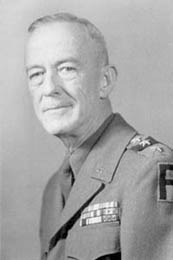
Japanese general with little combat experience before the Japanese declaration of war on the US; had served as a military observer with British forces in France and later as military attaché in London and in the press section of the Japanese War Ministry; briefly commanded forces in China in the late 1930s before being appointed Supreme Commander of Japanese Army Forces in the Philippines in December 1941; led the Japanese surprise assault on the Philippine island of Luzon, begun on December 22, that was to develop into the long and immensely costly Siege of Bataan, involving 74,000 Japanese troops in an extended struggle for control of the peninsula; though ultimately successful in forcing the beleaguered American and Filipino force to surrender, was much criticized for his handling of the operation and effectively relieved of command before the surrender; was nevertheless held responsible by the Allies for the vast number of deaths caused by the Bataan Death March, a forced trek by thousands of Allied troops taken prisoner at the end of the siege, in which over 10,000 are estimated to have died; was arrested in September 1945, convicted of war crimes at Manila, and executed by firing squad in April 1945.
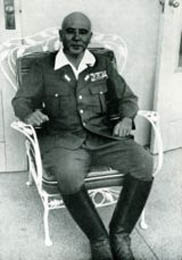
commanded the Japanese 33rd Army in Burma in 1944-45; conducted a skillful fighting retreat after the British victories at Kohima and Imphal; held off US and Chinese forces attempting to open the Burma Road in Janurary 1945; failed to dislodge the British at Meiktila.
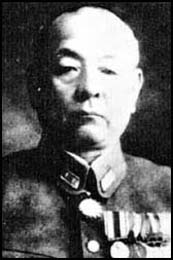
son of an Iowa harnessmaker, became President Franklin D. Roosevelt's closest and most trusted adviser; in the early years of the New Deal, worked mainly on domestic programs and was a principal architect of many work programs such as the WPA; after the war began, was appointed supervisor of the Lend-Lease Program and Roosevelt's special envoy, travelling to London and Moscow as Roosevelt's representative during 1941, to confer with Churchill and Stalin over American support against Germany; particularly admired by Churchill, was also present at the signing of the Atlantic Charter and subsequently attended all the major Allied conferences, advising on strategy and supplies; following the US entry into the war, was also appointed Chairman of the Munitions Assignment Board, and later member of the Pacific War Council and War Production Board; also acted as a personal liaison officer between Roosevelt and the US Chiefs of Staff; in the later stages of the war, after Roosevelt's death, made a great contribution to the difficult discussions with Stalin over the Soviet Union's position on Poland and other contentious issues; was able to break the deadlock that had developed at the San Francisco Conference and win a commitment from Stalin to a further 'Big Three' meeting, held at Potsdam in July 1945, though ill health prevented him from attending himself; among the many tributes paid to him after his death in January 1946, Churchill's was perhaps the most eloquent: Churchill spoke of 'the priceless work of Hopkins. . . and extraordinary man. . . who played a decisive part in the whole movement of the war. . . with a soul that flamed out of a frail and failing body.'
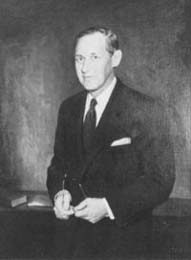
courageous and highly effective German tank commander and a consistent opponent of the Nazi regime, led a panzer group on the Eastern Front for the German invasion of Russia in June 1941; dismissed during Hitler's recriminatory purge of the German High Command after the failure outside Moscow in December 1941, was subsequently involved in the July Bomb Plot against Hitler, in which he was to have taken over as Army C-in-C. was arrested after the failure of the Plot and executed on August 8, 1944.

British field commander who was promoted under General Montgomery in August 1942 to command XIII Corps, which fought at Alam Halfa and El Alamein; after recovering from severe wounds suffered at the end of the Tunisian campaign, followed Montgomery to Europe to command XXX Corps, 21st Army Group for the invasion of Normandy and the drive across Northwest Europe.
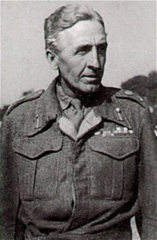
British naval commander; an outstanding submariner in WWI, was in command of the Royal Navy's reserve fleet in September 1939; after a brief period in command of the Northern Patrol blockading Germany, became Flag Officer, Submarines in December; in this capacity was responsible for training and administration, being promoted to admiral in 1941; his particular skills reached their full potential when he replaces Sir Percy Noble as C-in-C, Western Approaches in November 1942, and took operational control of the battle against U-boats in the Atlantic at a critical moment; his contribution to the Allied victory in the Battle of the Atlantic was enormous; brought intimate knowledge of submarine warfare and tactics to his command, and above all sponsored the formation of powerful submarine-hunting support groups, bravely withdrawing escorts from convoy service for extended specialized training in the role; from spring 1943 these gained a decisive upper hand in combat against U-boat 'wolfpacks'; remained in this post until the end of the war, when he retired.
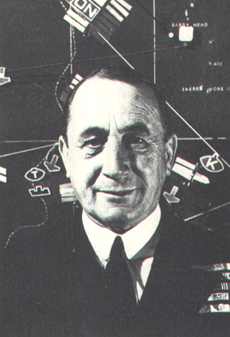
noted for victories in France and on the Eastern Front, and later, after serving six years in prison for war crimes, as a writer on military history; joined the German Army in 1904 and served in World War I; remained in the army during the Weimar period, and in 1935 was promoted to Major General and appointed to command the 18th Infantry Division of the reorganized army; promoted to Lieutenant-General and commanded the XV Army Corps from November 10, 1938, leading it in the invasion of Poland the following year; was successful in the Western Offensive of spring 1940, and was promoted to General of the Infantry on July 19, 1940; in Operation Barbarossa in 1941, commanded 3rd Panzer Group, capturing Minsk and Vitebsk, then in a shakeup in October, replaced General Carl-Heinrich von Stülpnagel as commander of the 17th Army in Ukraine; his army was driven back by a Russian offensive in January 1942; in June 1942 he took over from General Erich Höpner as commander of the 4th Panzer Army, which fought along the Bryansk Front and in support of the siege of Stalingrad-after the Russian Operation Uranus and the creation of the Kessel, his panzer group was the relief attempt to puncture Soviet defenses and create a corridor out of the Kessel for Paulus' Sixth Army, but failed; and in July 1943 in the Battle of Kursk; in the autumn of 1943 the Soviet army mounted a series of successful offensives that pushed the Germans back, and despite a distinguished record, Hoth, now Colonel General, was blamed by Hitler for part of the losses, was reassigned to the reserves in November; in April 1945 was recalled to active duty and assigned to command the defense of the Harz Mountains, a position he held until the end of the war; After the war, he was put on trial at the Subsequent Nuremberg Trials, found guilty of war crimes in the High Command Trial, and on October 27, 1948 sentenced to 15 years in prison. He was released in 1954 and spent his retirement writing. He died at Goslar, where he is buried.
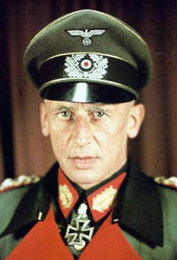
American congressman and senator and Roosevelt's Secretary of State from 1933-44; had been a committed supported of Woodrow Wilson and had deplored American failure to participate in the League of Nations; appointed in 1933 as Secretary of State for party political reasons rather that for his ability in foreign affairs, his uninformed and blinkered perception of Far Eastern affairs worked against the US State Department's attempts to reach any valuable decisions regarding US Far Eastern policy at a time when the absence of a clear and informed stand greatly exacerbated an already tense and difficult situation; although was active in developing relations with Latin America (the Good Neighbor Policy) and later in supporting the President's interventionist policies vis-à-vis the war in Europe, failed to take account of Ambassador Grew's repeated warnings about political events in Japan and was unable to contribute anything but a crude economic analysis to the developing crisis in the Far East; following the Japanese invasion of Indochina, and the imposition of the US oil embargo, conducted the negotiations with Japan during the late autumn of 1941 that failed to resolve hte intransigence of both sides over China and ended finally in a deadlock which precipitated the attack on Pearl Harbor; remained an energetic advocate of the development of the United Nations, playing an active part in international relations throughout the war as leader of the US delegation to the Moscow Conference in 1943 and a major participant at the Dumbarton Oaks Conference; retired in November 1944; for his contribution to the establishment of the UN, was awarded the Nobel Peace Prize in 1945.
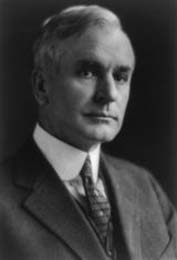
US ambassador to China after 1944, saw active service at the start of the Pacific War in the Philippines area and subsequently held a variety of diplomatic posts, in New Zealand, as envoy to Moscow and as Roosevelt's representative in China, where he worked to prepare the ground for the meeting with Churchill, Roosevelt and nationalist leader Chiang Kai-shek at the Cairo Conference; returning to China in August 1944 with a difficult brief to harmonize relationships between Chinese and US military establishments, also initiated conferences between rival Chinese leaders Chiang Kai-shek and Mao Tse-tung in an attempt to end the civil war in China; resigned in November 1945 in protest of what he believed to be State Department sabotage of his efforts to reconcile the communist and nationalist leaders in China.
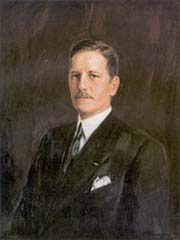
younger of two brothers and well-known Japanese generals, was director of the Hiroshima Military Preparatory School before being appointed to command the Japanese 17th Army based at Rabaul, after the attack on Pearl Harbor; during August 1942, took personal command of the Japanese efforts to retain control of Guadalcanal and the other islands in the Solomon Group; landed with his army on Guadalcanal on October 9, 1942 in an attempt to relieve the stricken and starving troops there and shore up the flagging Japanese defense, but was unable to overturn the American advantage secured by growing US superiority in the area around Guadalcanal; following the decisive Battle of Guadalcanal that finally stifled Japanese reinforcement of the island, and with the Japanese force falling victim to starvation and disease that killed over 100 men every day, made the decision to organize an evacuation from Cape Esperance; remained based at Rabaul until the end of the war, fighting later with his army on Bougainville and adjacent islands.
